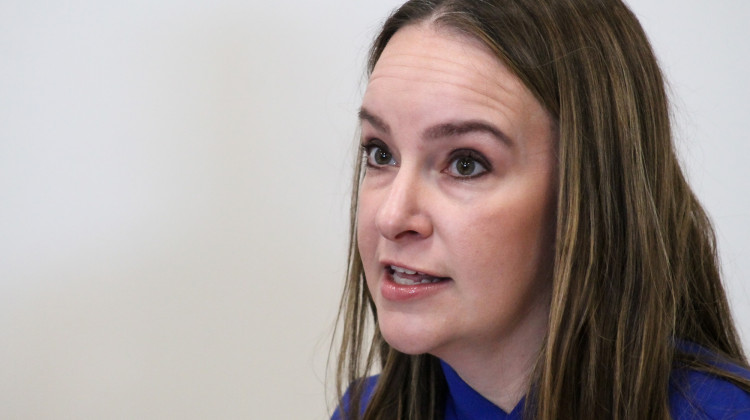
Indiana Medicaid Director Cora Steinmetz said the oversight process involved developing processes for both members and providers who may encounter issues with the program.
Lauren Chapman / IPB NewsIndiana launched a new long-term care program in July for Medicaid members 60 years or older. Medicaid officials say they plan to monitor the Pathways for Aging program closely for a full year to catch any potential issues.
Indiana Medicaid Director Cora Steinmetz said the program allows the state to “better manage” the quality of care and program costs. Rather than the fee-for-services structure, managed care entities — or insurance companies — now facilitate health plans for long-term care services.
Steinmetz said the Family and Social Services Administration completed a year-long process to ensure the program was ready for the July 1 launch.
“We were able to catch issues before the July 1 go live and feel that this process is important enough to extend this readiness-like approach to a year-long post-implementation monitoring period," Steinmetz said.
The post-launch oversight includes three areas of focus: go live reporting, on-site reviews and audits, and continued oversight and interaction with the insurance companies that are facilitating the plans.
The go live reporting includes weekly reports monitoring different parts of the program, such as call center management and claims processing. Those reports are then submitted and reviewed by executive level staff at FSSA, including Steinmetz.
The on-site reviews and audits process includes shadowing care and services coordination staff and call centers. It also includes “secret shopper calls” to each of the managed care entities to evaluate how well they’re assisting members — which Steinmetz highlights as a vital part of this process.
“Some of the best indicators about how things are going in these first 60 days of the pathways program are through our secret shopper calls,” Steinmetz said.
As the program gets further from the launch date, FSSA will shift into continued oversight and interaction with managed care entities.
“We continue to have daily stand up calls post-go live with all three managed care entities to quickly address and resolve issues that have been brought to the state's attention,” Steinmetz said. “We also have a number of avenues where we continue to work with stakeholders such as provider associations, member advocates, etc. to solicit feedback to share with the managed care entities and request action.”
After the program has been running for a year, Steinmetz said FSSA will move toward the same type of oversight and maintenance it provides for other managed care programs.
Steinmetz said the oversight process involved developing processes for both members and providers who may encounter issues with the program.
“We've been very direct with our managed care entity partners, that the two most important aspects of our Pathways go live is: one, ensuring members receive services. And then, two, that providers know how to properly submit claims and be reimbursed for providing those services,” Steinmetz said.
For providers, this includes several different approaches done in collaboration with the managed care entities, such as claims submission training, a claims monitoring work group to provide feedback, and a temporary emergency assistance program for providers that qualify. Steinmetz said Indiana also has an issue resolution process for providers.
“We have logged over 400 issues through our escalated issue resolution process and have closed well over 300 of these issues,” Steinmetz said. “Again, our daily stand up calls with the Pathways directors is an important way that we're continuing to monitor the status of these issues.”
Several of these mechanisms are the result of legislation passed during the 2024 legislative session, including the emergency assistance program and the claims monitoring work group.
Join the conversation and sign up for the Indiana Two-Way. Text "Indiana" to 765-275-1120. Your comments and questions in response to our weekly text help us find the answers you need on Medicaid and other statewide issues.
Steinmetz said there is still more work to be done on the claims submission part of the program.
“We'd like to see our home health and [home- and community-based services] claim percentages increase, so we're working with providers to ensure that they have the proper understanding of what an appropriate claim submission looks like for the three MCEs,” Steinmetz said.
Steinmetz said FSSA is pushing for training and educational opportunities for providers at the state level. She also said there is a team at FSSA dedicated to making sure the managed care entities comply with their contracts for the program.
For members, the state is also working to identify and address issues quickly. In addition to tracking how often and quickly managed care entities answer phone calls about the Medicaid program, Steinmetz said people enrolled in Pathways have access to independent member support services.
“[Member support services] provides members and their authorized representatives with education, advocacy, and support to navigate and also resolve issues they may experience while enrolled in the Pathways for Aging program,” Steinmetz said.
Steinmetz said FSSA has been using call center data to identify the top issues people are having in order to address those issues more broadly.
“As of now, the most common member call data into the managed care entities includes questions about eligibility, receiving a new ID card, finding a provider, and questions about the MCE network or covered services,” Steinmetz said.
If there is a bigger issue, Steinmetz said the state will get involved.
“When an urgent issue is flagged, that is a matter of health or safety, those issues are directly escalated to the state immediately,” Steinmetz said.
Steinmetz said FSSA will continue to update the Pathways program website with more information as they receive more questions from providers and members.
Abigail is our health reporter. Contact them at aruhman@wboi.org.
 DONATE
DONATE





 Support WFYI. We can't do it without you.
Support WFYI. We can't do it without you.